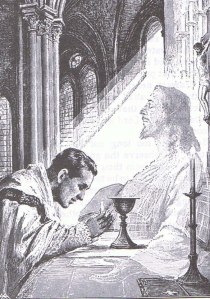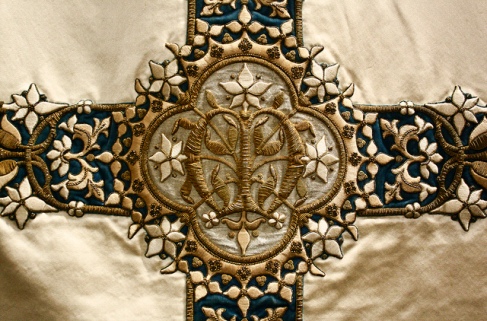The Wine of the Mass.
“Take me away with you–let us hurry! Let the king bring me into his chambers. We rejoice and delight in you; we will praise your love more than wine. How right they are to adore you!”– Song of Songs 1:4
When confronted with the mystery of the altar, the presence of God dwelling there, one is overcome by awe. Words escape some while others long to open their mouths in praise. In both cases, the heart groans silently. Have you ever taken time to notice all of the postures and gestures used during Mass? When the priest speaks a certain verse, we say a certain response. He kneels before the consecrated Eucharist, he whispers certain prayers and holds out his hands. When crossing the altar, we bow and starting the Mass, we make the sign of the cross. These actions are really just a hundred tiny ways we say “Lord, I love you.”
This disposition of reverence is the wine of the Mass. Our chanting, our vigils, our candles brightly burning are all signs of a people enamored by God’s presence. These things all serve to foster a union with God. They help us understand who God is and how we respond to Him. Reverence is the song of the wedding feast.
We behave differently at Mass than in the outside world. Feeling a sense of the sacred, our minds cease their restless churning. The structure and solemnity of the Holy Mass brings peace. It conveys a respect for the Lord’s house. In order to drink more deeply of the sacraments, we must lower ourselves, be humble and meek. It is then we hear what God is trying to tell us. Before approaching Holy Communion, we drink the cup of reverence which prepares us to drink the Saving Cup. Our palates are softened to receive the Living God.
To some, reverence is foolish, the dusty remnants of an old religion that lacks contemporary value. But nothing is further from the truth. Amidst materialism, reverence points to something higher. In a world of darkness, reverence sows light. We exert ourselves in charity, feeding the hungry caring for the sick, ministering to the sinner. Having drunk our fill, we may even give our very lives. Capable of so profoundly moving us with love of God and neighbor, wine is corresponds to the end of the Mass, which is adoration.
Wine is intoxicating, like the powerful, just and merciful presence of God, who loves us beyond measure. Our minds reel at such a love! Running and warm, it also becomes the precious Body and Blood of Christ, who intoxicated by love for us, gave up his life on the cross. Enlivened by this spirit, let us run to the King and Bridegroom of our souls!











